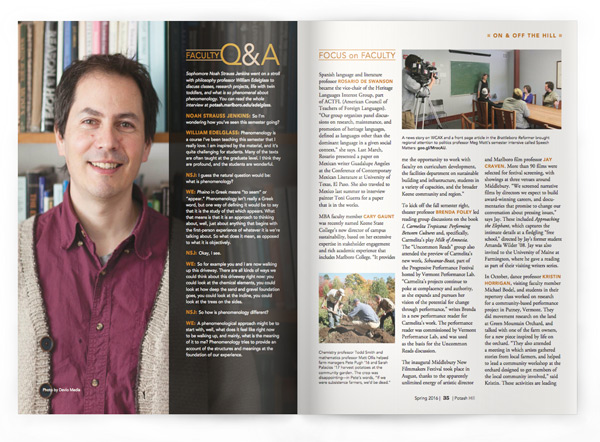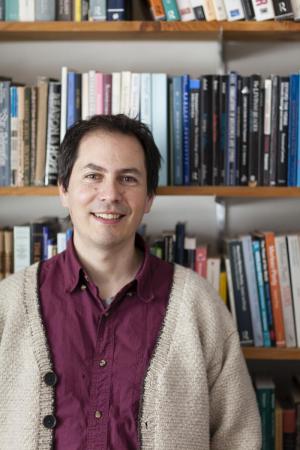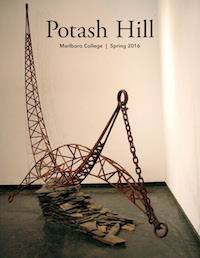
Faculty Q&A
 Sophomore Noah Strauss Jenkins went on a stroll with philosophy professor William Edelglass to discuss classes, research projects, life with twin toddlers, and what is so phenomenal about phenomenology. You can read the whole interview.
Sophomore Noah Strauss Jenkins went on a stroll with philosophy professor William Edelglass to discuss classes, research projects, life with twin toddlers, and what is so phenomenal about phenomenology. You can read the whole interview.
Noah Straus Jenkins: So I’m wondering how you’ve seen this semester going?
William Edelglass: Phenomenology is a course I’ve been teaching this semester that I really love. I am inspired by the material, and it’s quite challenging for students. Many of the texts are often taught at the graduate level. I think they are profound, and the students are wonderful.
NSJ: I guess the natural question would be: what is phenomenology?
WE: Phaino in Greek means “to seem” or “appear.” Phenomenology isn’t really a Greek word, but one way of defining it would be to say that it is the study of that which appears. What that means is that it is an approach to thinking about, well, just about anything that begins with the first-person experience of whatever it is we’re talking about. So what does it mean, as opposed to what it is objectively.
NSJ: Okay, I see.
WE: So for example you and I are now walking up this driveway. There are all kinds of ways we could think about this driveway right now: you could look at the chemical elements, you could look at how deep the sand and gravel foundation goes, you could look at the incline, you could look at the trees on the sides.
NSJ: So how is phenomenology different?
WE: A phenomenological approach might be to start with, well, what does it feel like right now to be walking up, and mainly, what is the meaning of it to me? Phenomenology tries to provide an account of the structures and meanings at the foundation of our experience.
Focus on Faculty
Spanish language and literature professor Rosario de Swanson became the vice-chair of the Heritage Languages Interest Group, part of ACTFL (American Council of Teachers of Foreign Languages). “Our group organizes panel discussions on research, maintenance, and promotion of heritage languages, defined as languages other than the dominant language in a given social context,” she says. Last March, Rosario presented a paper on Mexican writer Guadalupe Angeles at the Conference of Contemporary Mexican Literature at University of Texas, El Paso. She also traveled to Mexico last summer to interview painter Toni Guerra for a paper that is in the works.
MBA faculty member Cary Gaunt was recently named Keene State College’s new director of campus sustainability, based on her extensive expertise in stakeholder engagement and rich academic experience that includes Marlboro College. “It provides me the opportunity to work with faculty on curriculum development, the facilities department on sustainable building and infrastructure, students in a variety of capacities, and the broader Keene community and region.”
To kick off the fall semester right, theater professor Brenda Foley led reading group discussions on the book I, Carmelita Tropicana: Performing Between Cultures and, specifically, Carmelita’s play Milk of Amnesia. The “Uncommon Reads” group also attended the preview of Carmelita’s new work, Schwanze-Beast, part of the Progressive Performance Festival hosted by Vermont Performance Lab. “Carmelita’s projects continue to poke at complacency and authority, as she expands and pursues her vision of the potential for change through performance,” writes Brenda in a new performance reader for Carmelita’s work. The performance reader was commissioned by Vermont Performance Lab, and was used as the basis for the Uncommon Reads discussion.
The inaugural Middlebury New Filmmakers Festival took place in August, thanks to the apparently unlimited energy of artistic director and Marlboro film professor Jay Craven. More than 90 films were selected for festival screening, with showings at three venues around Middlebury. “We screened narrative films by directors we expect to build award-winning careers, and documentaries that promise to change our conversation about pressing issues,” says Jay. These included Approaching the Elephant, which captures the intimate details at a fledgling “free school,” directed by Jay’s former student Amanda Wilder ’08. Jay was also invited to the University of Maine at Farmington, where he gave a reading as part of their visiting writers series.
In October, dance professor Kristin Horrigan, visiting faculty member Michael Bodel, and students in their repertory class worked on research for a community-based performance project in Putney, Vermont. They did movement research on the land at Green Mountain Orchard, and talked with one of the farm owners, for a new piece inspired by life on the orchard. “They also attended a meeting in which artists gathered stories from local farmers, and helped to lead a community workshop at the orchard designed to get members of the local community involved,” said Kristin. These activities are leading up to an Orchard Pageant planned for July 2017 that will include dancing, puppets, and music.
In December, politics and gender studies professor Meg Mott participated in a CNN roundtable titled “Why Do Politicians Get Away with Lying?” “In America, when it comes to populist interests, facts are not as legitimate as feelings,” writes Meg. “At least when it comes to running election campaigns.” In August, Meg was quoted in a Christian Science Monitor article, also picked up by Yahoo.com, titled “Why Is ‘Teflon Trump’ Still So Popular?” Learn more. Meg was also quoted in a QC Research article titled “Young Voters,” where she applauded the key role young voters are playing in reframing political debate from one on “law and order” to one about justice and legitimacy.
In January 2015, economics professor John Rush presented a paper at the Economics of Global Poverty conference in Wenham, Massachusetts, titled “The Impact of Natural Disasters on Poverty in Indonesia.” He was also invited to present at the Southern Economic Association’s annual meeting in New Orleans in November, where he spoke about “Rural Households, Education, and the Empact of El Salvador’s 2001 Earthquakes.” “Both papers flow from my research agenda exploring the fact that natural disasters affect families not just through direct impacts but also by disrupting the businesses, institutions, and infrastructure of the wider community,” says John.
In October, Library Director Beth Ruane presented a “faculty forum” on her ongoing research in Nepal, titled “Searching in Nepal: Information-Seeking Behavior in Kathmandu.” “Libraries have always been a place of change and adaptation, and important places within a community where resources and ideas can be freely shared,” says Beth. “Without the information infrastructure upon which we have come to depend, how does knowledge circulate in Nepal?” In November and December, Beth traveled to Kathmandu to further her research on this and related questions.
As the co-curator of the New Metrics channel of Sustainable Brands, MBA faculty member Bill Baue helped organize the New Metrics Conference in Boston last October. “This year’s agenda, in my humble opinion, is the best so far in the history of the conference,” says Bill, who facilitated workshops on “Net Positive” and “Materiality,” in addition to speaking in sessions on “ThriveAbility.” MBA faculty member Mark McElroy also facilitating a workshop on the MultiCapital Scorecard. Bill and Mark co-authored an article in the July 2015 Journal of Responsible Finance, as well as parts of a new book titled A Leader’s Guide to ThriveAbility: A Multi-Capital Operating System for a Regenerative, Inclusive Economy. Mark also coauthored an article on the MultiCapital Scorecard in Harvard Business Review.
In October and November, psychology professor Tom Toleno discussed “Exploring Modern Africa” in a series of lectures, part of the fall lecture series at the Osher Lifelong Learning Institute, in Dummerston, Vermont. Subjects included postcolonial African society, religion, literature, culture, and education, as well as issues around working in Africa. Tom shared his experiences living, traveling, and working extensively in Africa, particularly in the Republic of Malawi.
MBA faculty member Lori Hanau had an article titled “The Paradigm Shift to Shared Leadership: From Round Earth to Flat Hierarchies” in the fall issue of Conscious Company magazine. “Of course, the earth was always round, even when we believed it wasn’t,” writes Lori. “When we change our paradigms, we make visible what we couldn’t imagine before.” In October, Lori also spoke at a Conscious Company “Sum+Substance” event, where she participated in a panel on the path to fulfilling work. Learn more.
In November, faculty members Cathy Osman (painting), John Willis (photography), and Seth Harter (Asian studies) participated in the first annual symposium of the Six Colleges Collaborative, a partnership of colleges in southeastern Vermont. The symposium, titled “Linking Your Course to the Community and Beyond,” explored ways to connect students to local employers, agencies, and civic organizations. In two roundtable discussions, the Marlboro faculty members shared their experiences enhancing student learning through interaction with community partners.
In November, religion professor Amer Latif gave a talk titled “The Sighs of Abraham: A Qur’anic and Sufi Portrait” at the All Souls Church in West Brattleboro. “The Qur’an describes Abraham as clement, and sighing often,” says Amer, who reflected on some of the ways in which Muslim contemplatives have understood Abraham’s friendship with God and his qualities of clemency and patience. Amer also led a discussion on campus about spiritual health, part of Student Life’s holistic education program titled For Your Engagement (FYE). In the words of one admiring sophomore who attended, “Amer totally killed it.”
In the last year, philosophy professor William Edelglass completed his term as co-director of the International Association of Environmental Philosophy, but he has remained busy regardless. He taught a graduate seminar on Phenomenology of the Body at the Indian Institute of Technology–Bombay, one of the top universities in India. William was interviewed by Insight Journal for an article titled “Cultivating Bodhicitta: Wisdom and Compassion in Śāntideva’s Introduction to the Awakened Life” (April 2015), and he has two chapters forthcoming in philosophy books to be published this year. William has also given several invited lectures in the past year, including “Describing the Beyond of Language: Phenomenology and Apophatic Discourse,” at the October meeting of the Society for Asian and Comparative Philosophy, in Atlanta.
In her new role as director of Marlboro’s Center for Creative Solutions, art history professor Felicity Ratté is currently in the throes of organizing a Spring Convening in April, on the subject of the future of public education. “Many of us in Windham County are thinking about Act 46 right now,” says Felicity. “The aim of this workshop is to think beyond the act. This event is structured to create a space where stakeholders can begin to define the “equity,” “excellence,” and “value” that the act promotes.
As a member of the Women’s Resource Center Advisory Board, physics professor Sara Salimbeni helped organize a reading and discussion of the book Schoolgirls, by Peggy Orenstein, at the beginning of the spring semester. The book explores the struggle with self-esteem some girls experience during adolescence, and the social costs of gender stereotypes in terms of declining academic achievement, especially in math and science.
Photography professor John Willis and music professor Matan Rubinstein collaborated to create a multimedia piece, part of the Eyes on the Land show at Shelburne Museum’s Pizzagalli Center for Art and Education last fall. The result of a partnership between the Shelburne Museum and Vermont Land Trust, the exhibit commissioned 13 contemporary Vermont artists and photographers to produce new works using conserved lands as their inspiration. John and Matan contrasted images and sounds from the Bunker Farm, in Dummerston, Vermont, with images and sounds from a scrap-metal yard, in their composition called “Inhabitation, Production/Consumption.” Learn more.

